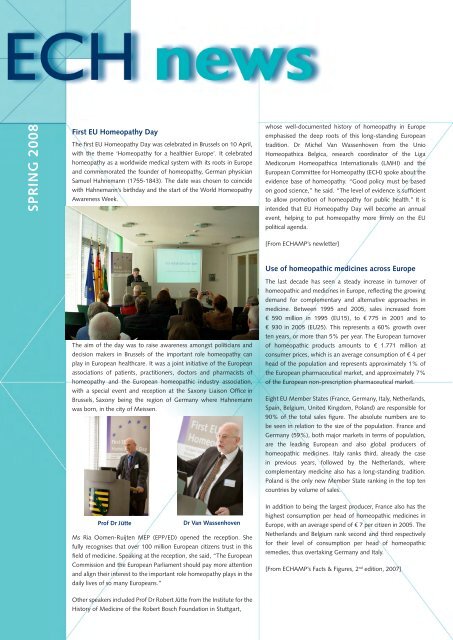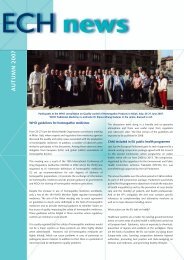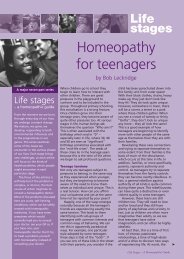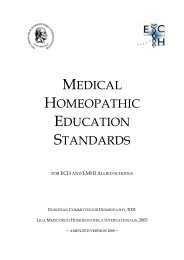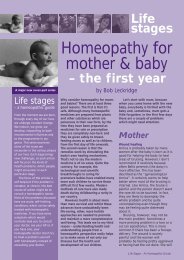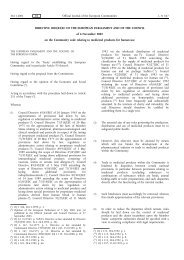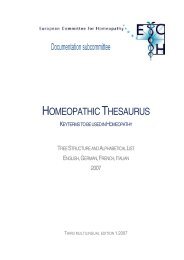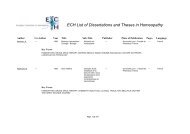English - European Committee for Homeopathy
English - European Committee for Homeopathy
English - European Committee for Homeopathy
Create successful ePaper yourself
Turn your PDF publications into a flip-book with our unique Google optimized e-Paper software.
SPRING 2008<br />
First EU <strong>Homeopathy</strong> Day<br />
The first EU <strong>Homeopathy</strong> Day was celebrated in Brussels on 10 April,<br />
with the theme ‘<strong>Homeopathy</strong> <strong>for</strong> a healthier Europe’. It celebrated<br />
homeopathy as a worldwide medical system with its roots in Europe<br />
and commemorated the founder of homeopathy, German physician<br />
Samuel Hahnemann (1755-1843). The date was chosen to coincide<br />
with Hahnemann’s birthday and the start of the World <strong>Homeopathy</strong><br />
Awareness Week.<br />
whose well-documented history of homeopathy in Europe<br />
emphasised the deep roots of this long-standing <strong>European</strong><br />
tradition. Dr Michel Van Wassenhoven from the Unio<br />
Homeopathica Belgica, research coordinator of the Liga<br />
Medicorum Homeopathica Internationalis (LMHI) and the<br />
<strong>European</strong> <strong>Committee</strong> <strong>for</strong> <strong>Homeopathy</strong> (ECH) spoke about the<br />
evidence base of homeopathy. “Good policy must be based<br />
on good science,” he said. “The level of evidence is sufficient<br />
to allow promotion of homeopathy <strong>for</strong> public health.”It is<br />
intended that EU <strong>Homeopathy</strong> Day will become an annual<br />
event, helping to put homeopathy more firmly on the EU<br />
political agenda.<br />
[From ECHAMP’s newletter]<br />
The aim of the day was to raise awareness amongst politicians and<br />
decision makers in Brussels of the important role homeopathy can<br />
play in <strong>European</strong> healthcare. It was a joint initiative of the <strong>European</strong><br />
associations of patients, practitioners, doctors and pharmacists of<br />
homeopathy and the <strong>European</strong> homeopathic industry association,<br />
with a special event and reception at the Saxony Liaison Office in<br />
Brussels, Saxony being the region of Germany where Hahnemann<br />
was born, in the city of Meissen.<br />
Use of homeopathic medicines across Europe<br />
The last decade has seen a steady increase in turnover of<br />
homeopathic and medicines in Europe, reflecting the growing<br />
demand <strong>for</strong> complementary and alternative approaches in<br />
medicine. Between 1995 and 2005, sales increased from<br />
€ 590 million in 1995 (EU15), to € 775 in 2001 and to<br />
€ 930 in 2005 (EU25). This represents a 60% growth over<br />
ten years, or more than 5% per year. The <strong>European</strong> turnover<br />
of homeopathic products amounts to € 1.771 million at<br />
consumer prices, which is an average consumption of € 4 per<br />
head of the population and represents approximately 1% of<br />
the <strong>European</strong> pharmaceutical market, and approximately 7%<br />
of the <strong>European</strong> non-prescription pharmaceutical market.<br />
Eight EU Member States (France, Germany, Italy, Netherlands,<br />
Spain, Belgium, United Kingdom, Poland) are responsible <strong>for</strong><br />
90% of the total sales figure. The absolute numbers are to<br />
be seen in relation to the size of the population. France and<br />
Germany (59%), both major markets in terms of population,<br />
are the leading <strong>European</strong> and also global producers of<br />
homeopathic medicines. Italy ranks third, already the case<br />
in previous years, followed by the Netherlands, where<br />
complementary medicine also has a long-standing tradition.<br />
Poland is the only new Member State ranking in the top ten<br />
countries by volume of sales.<br />
Prof Dr Jütte<br />
Dr Van Wassenhoven<br />
Ms Ria Oomen-Ruijten MEP (EPP/ED) opened the reception. She<br />
fully recognises that over 100 million <strong>European</strong> citizens trust in this<br />
field of medicine. Speaking at the reception, she said, “The <strong>European</strong><br />
Commission and the <strong>European</strong> Parliament should pay more attention<br />
and align their interest to the important role homeopathy plays in the<br />
daily lives of so many <strong>European</strong>s.”<br />
In addition to being the largest producer, France also has the<br />
highest consumption per head of homeopathic medicines in<br />
Europe, with an average spend of € 7 per citizen in 2005. The<br />
Netherlands and Belgium rank second and third respectively<br />
<strong>for</strong> their level of consumption per head of homeopathic<br />
remedies, thus overtaking Germany and Italy.<br />
[From ECHAMP’s Facts & Figures, 2 nd edition, 2007]<br />
Other speakers included Prof Dr Robert Jütte from the Institute <strong>for</strong> the<br />
History of Medicine of the Robert Bosch Foundation in Stuttgart,
2<br />
63th LMHI World homeopathic congress in Oostende<br />
These yearly world events are very seldom organised in Belgium<br />
(1856, 1913, 1953, 1972). However, this year it was organised to celebrate<br />
the 20th anniversary of the Unio Homeopathica Belgica. This<br />
congress was also exceptional because it was supported by several<br />
Belgian University Professors, partially funded by the national fund <strong>for</strong><br />
scientific research (FNRS) and accredited in medicine (INAMI). More<br />
than 700 homeopathic doctors from 61 countries attended this meeting,<br />
including 160 Belgians. All participants were very enthusiastic<br />
about the very high quality and diversity of this congress. The visit of<br />
the Queen of Belgium was most welcome.<br />
The Belgian Queen, LMHI Executive <strong>Committee</strong> and congress<br />
organisers<br />
The central theme of the congress was built around one sentence:<br />
“Mutual respect when looking at evidence”. There was indeed an<br />
ideological confrontation but debates were always constructive and<br />
serene. The high quality of the presentations was guaranteed by the<br />
scientific committee that made a selection looking at the level of scientific<br />
evidence and the correspondence in line with the congress theme.<br />
The best presentation was awarded to Dr Gustavo Dominici <strong>for</strong><br />
his talk about “Hydrogenium peroxydatum - H 2<br />
O 2<br />
- Proving results<br />
and clinical use in humans and animals of hydrogen peroxide”. The<br />
proving was controlled by a placebo group and results verified by a<br />
large clinical study on humans and animals.<br />
The clinical verification of homeopathic symptoms was indeed the<br />
first priority of the congress and many groups presented their understanding<br />
of this theme. No doubt that there is still work to do within<br />
the ECH sub-committees to find a common accepted strategy and<br />
to give some guidance <strong>for</strong> this extremely important research activity.<br />
Provings are the start of homeopathy, but they are of no value if they<br />
are not verified in the practice. We have the knowledge, we have the<br />
tools and we need people and clinical data to go further. At the next<br />
General Assembly of the ECH in November 2008, all these aspects<br />
will be discussed.<br />
A DVD about the congress will be available very soon, to get<br />
more in<strong>for</strong>mation about the DVD please contact Valérie Lenaerts:<br />
valerie@bjain.com.<br />
<strong>European</strong> CAM info centre<br />
Scientific research in the field of Complementary and<br />
Alternative Medicine is increasing both quantitatively and<br />
qualitatively. The outcome of this research is usually presented<br />
only in scientific journals and to fellow scientists, using<br />
scientific terminology. Thus, the in<strong>for</strong>mation rarely reaches<br />
decision makers on <strong>European</strong> health policies and when it does,<br />
it may be difficult <strong>for</strong> decision makers to read and understand<br />
in the limited time they have available. This problem is not<br />
systematically taken care of by the organisations and institutes<br />
presently active in the field of CAM research. Consequently<br />
there is a communication gap to be bridged. As long as the<br />
latter exists, it will be hard to convey the message to the<br />
political decision makers, namely that substantial and good<br />
quality research in CAM does show potential <strong>for</strong> much<br />
improved public health care.<br />
The <strong>European</strong> In<strong>for</strong>mation Centre <strong>for</strong> Complementary and<br />
Alternative Medicine (EICCAM) is being set up to bridge this<br />
gap. Its aim is the communication of scientific and health<br />
care related in<strong>for</strong>mation on CAM to the media, politicians,<br />
legislators and other stakeholders in a way appropriate to the<br />
needs of the target groups. Its in<strong>for</strong>mation will be independent,<br />
comprehensive, accessible and quality assured in order to<br />
contribute to in<strong>for</strong>med decision-making. It is intended to make<br />
the scientific voice of CAM heard and understood in Europe,<br />
to focus on communication and in the longer term to become<br />
the first interlocutor on <strong>European</strong> scientific CAM affairs.<br />
This means that the Centre will collect and update scientific<br />
in<strong>for</strong>mation on CAM on a regular basis, convert the scientific<br />
in<strong>for</strong>mation in summarised and understandable in<strong>for</strong>mation<br />
<strong>for</strong> the educated non-expert public, monitor the input and<br />
output of in<strong>for</strong>mation. Also it will network with the scientific<br />
community, with all CAM stakeholders, organise or participate<br />
in scientific events on CAM and take any other relevant<br />
initiatives.<br />
The In<strong>for</strong>mation Centre is being set up as a public foundation,<br />
with a management board and a scientific committee. The<br />
scientific committee will select the in<strong>for</strong>mation input and<br />
output, decide on actions and activities and, most importantly,<br />
ensure its independence. The management board takes care<br />
of the daily business and is composed of minimally five and<br />
maximally nine members, of which one member is member of<br />
the scientific committee.<br />
The scientific committee consists of nine full members, of<br />
which five members must be specialised in at least one of the<br />
following selected therapies: acupuncture, herbal medicine,<br />
homeopathy, anthroposophic medicine, osteopathy &<br />
chiropractic and four members possess expertise in history,<br />
qualitative research, economics, or in<strong>for</strong>mation & transparency,<br />
related to CAM therapies. The scientific committee includes<br />
distinguished research experts working at <strong>European</strong> universities<br />
and with expertise in the CAM field, such as Rudolf Bauer,<br />
Stefan Baumgartner, Roman Huber, Robert Jütte, Karin Kraft,<br />
Laila Launso, George Lewith, Karen Pilkington, Friedrich-<br />
Wilhelm Schwarz, Harald Walach, Wolfgang Weidenhammer,<br />
and Claudia Witt.
3<br />
To date EICCAM has been given some funding, but more funding<br />
has to be obtained to establish a firm sustainable infrastructure.<br />
Readers of this article who are aware of possible charitable funding<br />
are encouraged to contact the Chair of the EICCAM Management<br />
Board, Dr Susanne Schunder-Tatzber, e-mail: s.schund@ping.at.<br />
Chair <strong>for</strong> Research in CAM <strong>for</strong> Claudia Witt<br />
Prof. Dr. Claudia Witt has been appointed holder of the new Karl<br />
and Veronica Carstens Foundation Endowed Chair <strong>for</strong> Research in<br />
Complementary/Alternative Medicine at the Charité University<br />
Medical Center in Berlin. For the first time in Germany, world-class<br />
research in this area of inquiry will thus be possible in the context of<br />
a university chair. Following an open competition, Claudia Witt was<br />
chosen <strong>for</strong> this prestigious appointment based on her outstanding<br />
scientific work and extensive teaching experience.<br />
The chair is located at Charité’s<br />
Institute <strong>for</strong> Social Medicine,<br />
Epidemiology and Health Economics.<br />
A grant of €1 million will fund<br />
the professorship, as well as two<br />
associate positions, <strong>for</strong> a period of five<br />
years. With this grant, the Carstens<br />
Foundation hopes to promote<br />
research in the areas of naturopathy,<br />
homeopathy, and Chinese Medicine.<br />
The director of the foundation, Dr.<br />
Henning Albrecht, emphasises the<br />
important role the new chair will<br />
play in the future of complementary medicine: ‘First-rate research<br />
is essential to ensure the long-term acceptance of complementary<br />
treatment methods and to incorporate these into everyday patient<br />
care.<br />
Professor Witt’s main scientific interest lies in studying the efficacy,<br />
safety, and cost-effectiveness of complementary medical treatments,<br />
especially in the areas of Chinese medicine and homeopathy. In<br />
recent years, she has set international standards by coordinating a<br />
range of rigorously designed, large-scale studies on treatments such<br />
as acupuncture. Professor Witt is approaching her new position with<br />
great enthusiasm: ‘More than sixty per cent of the German population<br />
uses complementary medicine, and yet we still know very little about<br />
its efficacy or potential side effects. I’m excited about this opportunity<br />
to help bridge the gap between real-world treatment and scientific<br />
evidence.’<br />
A number of comprehensive research projects have already been<br />
planned <strong>for</strong> the coming years, including studies on individual<br />
treatment methods such as qigong, acupuncture, and homeopathy.<br />
Another of Professor Witt’s key interests is educating and supporting<br />
young physicians and scientists through undergraduate and graduate<br />
study, post-graduate training, and conferences.<br />
Charité’s Institute <strong>for</strong> Social Medicine, Epidemiology and Health<br />
Economics is the ideal place to pursue these goals. Researchers at<br />
the Institute <strong>for</strong> Social Medicine, Epidemiology and Health Economics<br />
have been studying the efficacy and benefits of complementary<br />
medicine treatments since 1997. Their work, including studies on<br />
acupuncture and homoeopathy in patients with chronic disease,<br />
has set international standards. The institute’s current director, Prof.<br />
Dr. Stefan N. Willich, looks towards the future with confidence:<br />
‘Our institute has gained worldwide recognition <strong>for</strong> its first-rate<br />
research on complementary medicine. With Professor<br />
Witt’s help, we will be able to continue to build upon<br />
this position in the future.’ [From Charité’s press release]<br />
More info at: http://www.charite.de/cam<br />
<strong>European</strong> CAM doctors collaborating<br />
On the <strong>European</strong> level there is an increasing collaboration<br />
among the four <strong>European</strong> umbrella organisations of doctors<br />
in the field of Complementary and Alternative Medicine<br />
(CAM), i.e. <strong>European</strong> <strong>Committee</strong> <strong>for</strong> <strong>Homeopathy</strong> (www.<br />
homeopathyeurope.org), <strong>European</strong> Council <strong>for</strong> Plurality in<br />
Medicine (ECPM, www.ecpm.org), International Council <strong>for</strong><br />
Medical Acupuncture and Related Techniques (ICMART, www.<br />
icmart.org) and International Federation of Anthroposophic<br />
Medical Associations (IVAA, www.ivaa.info), jointly<br />
representing 132 medical CAM associations across Europe.<br />
The four organisations seek to raise the awareness of the<br />
potential contribution of CAM to <strong>European</strong> healthcare<br />
among EU decision makers. The organisations teamed up<br />
during the lobby <strong>for</strong> inclusion of CAM into the 7th Research<br />
Framework Programme and the Public Health Programme<br />
2008-2013 of the <strong>European</strong> Union and issued joint position<br />
papers. In addition, they published some joint documents,<br />
such as Model Guidelines <strong>for</strong> the Practice of Complementary<br />
Therapies (CAM) by Medical Doctors in the <strong>European</strong> Union<br />
and Complementary Medicine (CAM) - its current position<br />
and its potential <strong>for</strong> <strong>European</strong> Healthcare.<br />
The Model Guidelines <strong>for</strong> the Practice of Complementary<br />
Therapies (CAM) by Medical Doctors in the <strong>European</strong> Union<br />
are aimed at ensuring the public health and safety by facilitating<br />
the proper and effective use of both conventional and CAM<br />
treatments, while educating physicians on the adequate<br />
safeguards needed to ensure their services are provided within<br />
the bounds of acceptable professional practice. The ECH,<br />
ECPM, ICMART and IVAA believe that adoption of guidelines<br />
based on this model will protect legitimate medical use of<br />
CAM while avoiding unacceptable risk.<br />
The document Complementary Medicine (CAM) - its current<br />
position and its potential <strong>for</strong> <strong>European</strong> Healthcare describes<br />
how all the major CAM therapies approach illness; firstly by<br />
trying to support and induce the self-healing process of the<br />
individual. If recovery can occur from this alone, the likelihood<br />
of adverse effects and the need <strong>for</strong> high-impact, high-cost<br />
intervention is reduced. It is this orientation towards selfhealing<br />
and health promotion – improving health rather than<br />
defeating disease – that makes CAM approaches especially<br />
appropriate. CAM, which is demanded by many millions of<br />
<strong>European</strong> citizens, has the potential to humanise modern<br />
medicine and widen its vision beyond disease to health and<br />
wellbeing in its widest sense. The document was presented<br />
at a recent meeting at the Public Health Executive Agency in<br />
Luxembourg where the possibilities <strong>for</strong> CAM projects in the<br />
Public Health Programme 2008-2013 were discussed.<br />
Both documents can be downloaded from the ECH website<br />
at www.homeopathyeurope.org, click on publications.
ECH General Assembly 15/16 November<br />
ECH General Assemblies take place every 2 years and are<br />
usually attended by 100-150 people. People who dedicate<br />
themselves to working <strong>for</strong> homeopathy in Europe. The sixth<br />
ECH General Assembly is approaching; it will take place on<br />
Saturday 15 and Sunday 16 November 2008 in Brussels.<br />
There is a strong need to raise the awareness of the therapeutic<br />
potential of homeopathy with the national and <strong>European</strong> policy<br />
makers. At the same time, more official participation in the national<br />
healthcare systems entails the necessary development of professional<br />
standards and the <strong>for</strong>mulation of policies in several areas. Not only<br />
at a national level. In fact, a great deal of matters can be more<br />
appropriately dealt with on a <strong>European</strong> level.<br />
The upcoming ECH General Assembly in November provides the<br />
ideal opportunity <strong>for</strong> reflection on how the ECH is playing its role in<br />
Europe and <strong>for</strong> development of our future policy. At the Assembly all<br />
subcommittees, i.e. documentation, education, provings, pharmacy,<br />
politics, patients/users’ interests, basic and clinical research, veterinary<br />
medicine and dentistry will have simultaneous working sessions.<br />
Please help us to make this gathering to a great success. Come and<br />
tell us what else the ECH, in your opinion, should do <strong>for</strong> homeopathy<br />
in Europe and participate in the continuing work of the ECH<br />
subcommittees. It is of utmost importance that more people become<br />
involved in the work <strong>for</strong> homeopathy in Europe. Several subcommittees<br />
need more participation. We would especially appreciate it if more<br />
people from the new EU Member States were to contribute to our<br />
work. We seek to include delegates from all <strong>European</strong> countries in all<br />
subcommittees.<br />
If you are interested in participating in this meeting and the working<br />
session of one of the subcommittees you are requested to complete<br />
the registration <strong>for</strong>m that can be downloaded from the ECH website.<br />
Please return the completed registration <strong>for</strong>m to the ECH secretariat<br />
in Brussels, preferably be<strong>for</strong>e 30 September 2008. The receipt<br />
of your registration <strong>for</strong>m will be confirmed and the agenda of the<br />
subcommittee meetings will be dispatched in good time be<strong>for</strong>e the<br />
meeting.<br />
LMHI - ECH booklet “Scientific framework of<br />
homeopathy – Evidence Based <strong>Homeopathy</strong>”<br />
After the 63rd LMHI congress a new booklet has been edited. It is a<br />
joint production of the Liga Medicorum Homeopathica Internationalis<br />
and of the <strong>European</strong> <strong>Committee</strong> <strong>for</strong> <strong>Homeopathy</strong>.<br />
<strong>European</strong> Congress of Integrative Medicine<br />
The first <strong>European</strong> Congress of Integrative Medicine will take<br />
place in Berlin, from 7 to 9 November 2008. The congress<br />
is aimed at getting together scientists and physicians from<br />
both conventional and complementary medical fields to<br />
discuss current issues on several indications including cancer,<br />
cardiovascular disease, pain, atopic disease and gastrointestinal<br />
disorders. The congress, which will take place annually in the<br />
future, will provide a plat<strong>for</strong>m to further develop integrative<br />
medicine and models of comprehensive care.<br />
Integrative medicine has to be understood as bridge between<br />
conventional western medicine and complementary medical<br />
procedures and providers. Integrating the various approaches<br />
offers great potential <strong>for</strong> improving individual medical care.<br />
That is why the theme <strong>for</strong> the 1st <strong>European</strong> Congress <strong>for</strong><br />
Integrative Medicine is: “The Future of Comprehensive<br />
Patient Care”.<br />
With regard to this congress, the close and successful scientific<br />
collaboration with various medical societies (Deutsche<br />
Krebsgesellschaft, Deutsche Gesellschaft für Schmerztherapie,<br />
Deutsche Gesellschaft für Kardiologie – Herz- und<br />
Kreislauf<strong>for</strong>schung, International Society <strong>for</strong> Complementary<br />
Medical Research) is evidence of the growth of importance,<br />
which integrative medicine experiences across the borders of<br />
scientific areas.<br />
The congress will be organised by Prof. Dr. Stefan Willich of<br />
the Institute <strong>for</strong> Social Medicine, Epidemiology and Health<br />
Economics of the Charité University Medical Center in Berlin,<br />
Germany. More in<strong>for</strong>mation can be found at the conference<br />
website www.ecim-congress.org<br />
Secretariat<br />
<strong>European</strong> <strong>Committee</strong> <strong>for</strong> <strong>Homeopathy</strong><br />
Chaussée de Bruxelles 132, box 1<br />
1190 Brussels - Belgium<br />
Tel. +32-2-3453597<br />
Fax +32-2-3461826<br />
E-mail info@homeopathyeurope.org<br />
Website www.homeopathyeurope.org<br />
4<br />
This booklet aims at considering all important aspects of the scientific<br />
framework of Homeopathic practice including ethical questions, evaluation<br />
of daily practice, looking at the level of scientific evidence of<br />
each of these aspects in an objective way. The conclusions are clear,<br />
homeopathy has to stay in the framework of medical practice and it is<br />
even a necessity <strong>for</strong> public health. Of course more research is always<br />
needed but the facts are already indisputable. This booklet will be distributed<br />
at the next General Assembly of ECH in November 2008. It is<br />
already available electronically at the secretarial office of the ECH. Do<br />
not hesitate to use it <strong>for</strong> the promotion of homeopathy at Universities<br />
or at political level.<br />
Editors<br />
Dr Ton Nicolai, Dr Patricia Le Roux,<br />
Mrs Enid Segall<br />
Please send any contributions <strong>for</strong> the<br />
newsletter to the ECH secretariat


